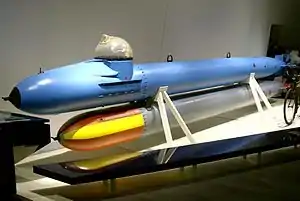Marder (submarine)
The Marder was a German midget submarine developed from the Neger.[1] The craft was 8.3 metres (27 ft 3 in) long and unlike the Neger included a flooding tank in the nose allowing it to dive.[1] Another improvement was the dome through which the pilot viewed the outside world that also served as the craft's entrance and exit was made openable from the inside.[1] Maximum diving depth was about 25 metres (82 ft).[2]
 Marder on display at the Bundeswehr Military History Museum | |
| General characteristics | |
|---|---|
| Type: | Midget submarine |
| Length: | 8.3 m (27 ft 3 in) o/a |
| Beam: | 0.533 m (21 in) |
| Propulsion: | AEG-AV 76 Eto, 12 metric horsepower (8.8 kW; 12 shp) |
| Speed: | 3.2–4.2 kn (5.9–7.8 km/h; 3.7–4.8 mph) |
| Test depth: | 40 m (130 ft) |
| Complement: | 1 |
| Armament: | 1 × 53.3 cm (21 in) torpedo |
The submarine's first operations took place on the night of 2 August 1944, when Nazi Germany's Kriegsmarine's Small Battle Units made their largest effort of the war. 58 human torpedoes[3] of the Neger-type and 22 Linse vessels were launched against Allied shipping off Normandy as part of a combined operation with Negers and explosive Linse boats.[1] One Royal Navy destroyer escort, HMS Quorn was sunk by a human torpedo along with one minesweeper, HMS Gairsay, and one landing craft by the German motor boats; at a cost of 41 Neger and 22 Linsen craft.[3]
References
| Wikimedia Commons has media related to Marder (Torpedo). |
- Paterson, Lawrence (2006). Weapons of Desperation German Frogmen and Midget Submarines of World war II. Chatham Publishing. pp. 49–51. ISBN 978-1-86176-279-5.
- Kemp, Paul (1996). Underwater Warriors. Arms & Armour Press. pp. 186–188. ISBN 1-85409-228-6.
- Brown p. 116
Bibliography
- Brown, David. Warship Losses of World War Two. Arms and Armour, London, Great Britain, 1990. ISBN 0-85368-802-8.
- Prenatt, Jamie & Stille, Mark (2014). Axis Midget Submarines: 1939–45. Oxford, UK: Osprey Publishing. ISBN 978-1-4728-0122-7.